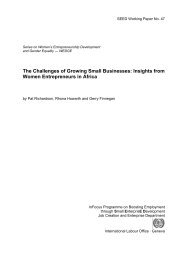Social and Solidarity Economy: Our common road towards Decent ...
Social and Solidarity Economy: Our common road towards Decent ...
Social and Solidarity Economy: Our common road towards Decent ...
You also want an ePaper? Increase the reach of your titles
YUMPU automatically turns print PDFs into web optimized ePapers that Google loves.
SOCIAL AND SOLIDARITY ECONOMY ACADEMY<br />
Box 1.4: <strong>Social</strong> movements, civil society <strong>and</strong> the SSE<br />
What do peasants’ organizations, mutual health societies, savings <strong>and</strong> credit unions, cooperatives,<br />
associations fighting HIV/AIDS, social enterprises, certain foundations, associations operating in<br />
reforestation or programmes for integrating the innumerable jobless young graduates in African capitals<br />
have in <strong>common</strong>?<br />
They all confine their activities to producing goods or services (which may or may not be supplied by<br />
other operators), <strong>and</strong> see their economic mission as achieving one of several objectives, such as:<br />
improving production conditions; making the services that are provided accessible to people who<br />
otherwise would not have access to them; or taking account of societal <strong>and</strong> environmental challenges. A<br />
further feature of these organizations is that they set l<strong>and</strong>marks in their operating principles, such as<br />
allowing control by members, workers or users; adjusting the rules for distributing <strong>and</strong> locating the<br />
surpluses generated; finding a balance between generating profits (necessary for developing any<br />
enterprise) <strong>and</strong> service to the members <strong>and</strong>/or community; ensuring a balance of power among the<br />
various stakeholders in decision-making, <strong>and</strong> so on. These concerns are certainly reminiscent of those of<br />
workers’ organizations <strong>and</strong> demonstrate the natural links that exist between the social economy <strong>and</strong> the<br />
workers’ <strong>and</strong> farmers’ union movements.<br />
Even where regulations provide a framework for these various components, the social economy is also a<br />
movement, since it aims to adjust <strong>and</strong> correct certain faults or trends. Forming a movement means<br />
adopting a more forward-looking approach, looking ahead to future trends in order to safeguard against<br />
risks (generated by the market <strong>and</strong> by the State) <strong>and</strong> to prepare to make the necessary adjustments in the<br />
sector. If social economy organizations were isolated in their sectors of activity or grouped solely on the<br />
basis of legal status, they would lose the advantage of sharing experiences <strong>and</strong> the visibility of an<br />
economic <strong>and</strong> social force that is supported by committed citizens.<br />
Given the profile of the pioneers <strong>and</strong> the <strong>common</strong> features of these organizations, it is only logical that a<br />
more political approach would develop. These social economy movements have various concerns:<br />
combining economic <strong>and</strong> social objectives in societies where the economic <strong>and</strong> social sectors are often<br />
very segmented (as can be seen by the jurisdictions of the ministries concerned) <strong>and</strong> are financed by<br />
resources which come from very different sources (taxes <strong>and</strong>/or national <strong>and</strong> international solidarity in the<br />
first case <strong>and</strong> the market in the second case); the defence of certain practices in market economies (such<br />
as the non-profit nature of insurance or health care); the legitimacy <strong>and</strong> (legal <strong>and</strong> political) protection of<br />
certain forms of institution in a free market economy; or the detection of societal problems.<br />
As a result, the social economy can take the form of social movements, which can be formal (i.e.<br />
platforms or federations), informal or ad hoc. Likewise, they can be the result of efforts to gather<br />
organizations together by sector, country, region, etc. Irrespective of the reasons for which they have<br />
united, these organizations are an economic, social <strong>and</strong> political force, <strong>and</strong> they have <strong>common</strong> concerns.<br />
Although, some of these movements are often fragile <strong>and</strong> far from global, organizations that can be<br />
affiliated with the SSE are part of civil society in the regional, national or international political arena.<br />
1.5.2 Empowerment<br />
Empowerment is an important factor that allows<br />
individuals <strong>and</strong> communities to have a voice <strong>and</strong> be<br />
represented. Empowerment can be built through a<br />
variety of processes <strong>and</strong> mechanisms. There is no<br />
doubt that participation <strong>and</strong> membership in SSEOs<br />
contribute to an empowerment process. Members<br />
<strong>and</strong> users gain empowerment through their active<br />
involvement in the participatory decision- making<br />
process within the organization <strong>and</strong> outside the<br />
organizations when they bargain with external<br />
14<br />
READER

















